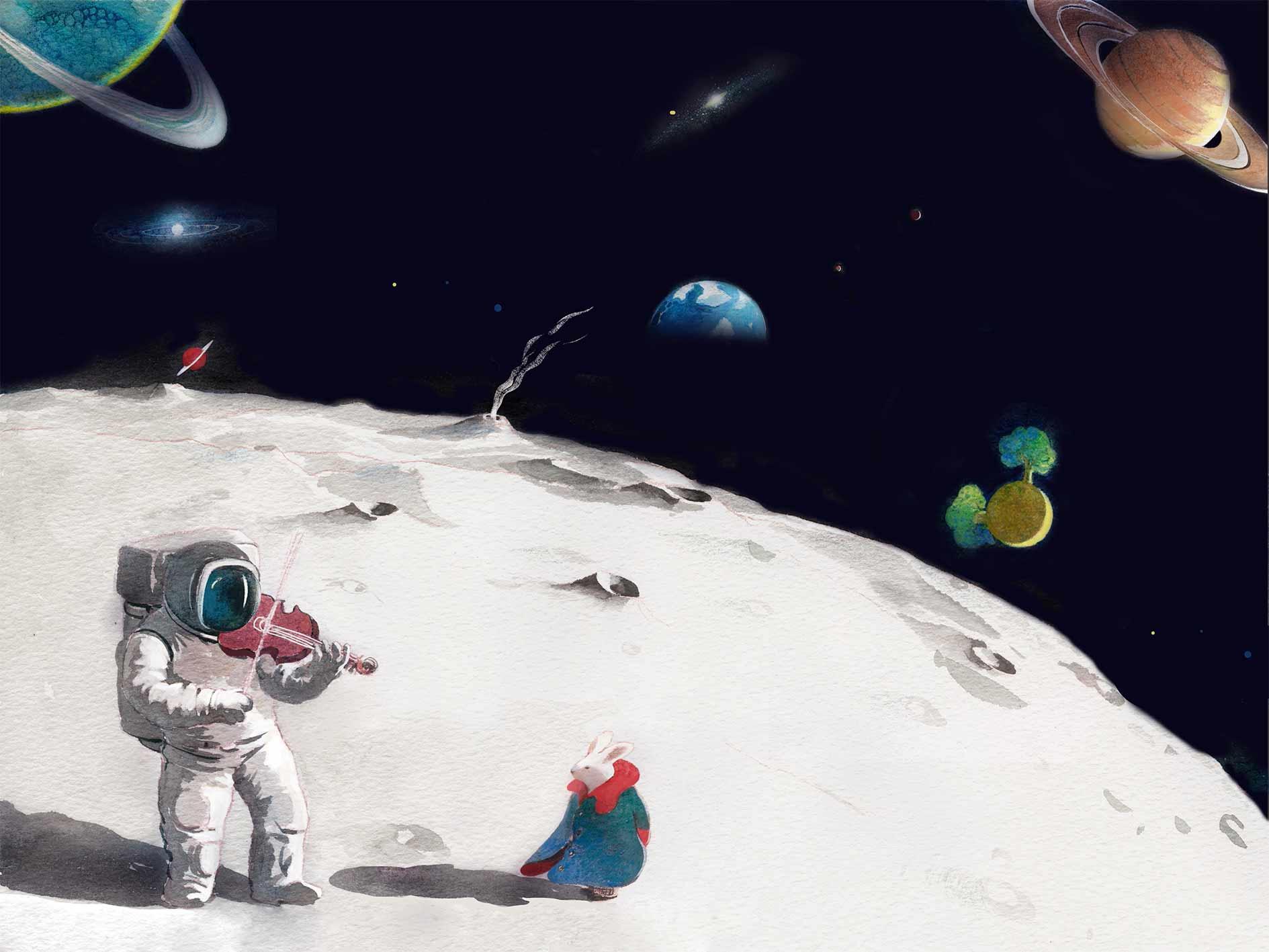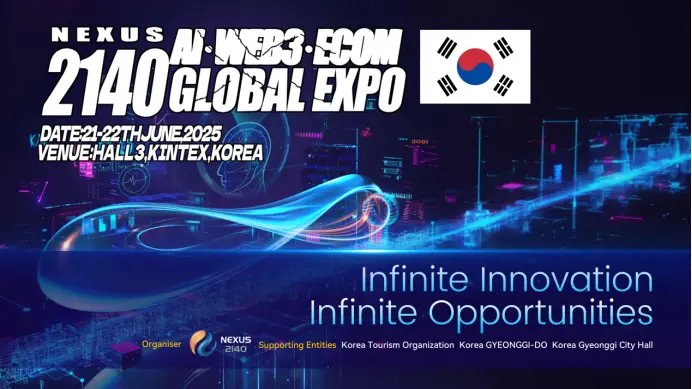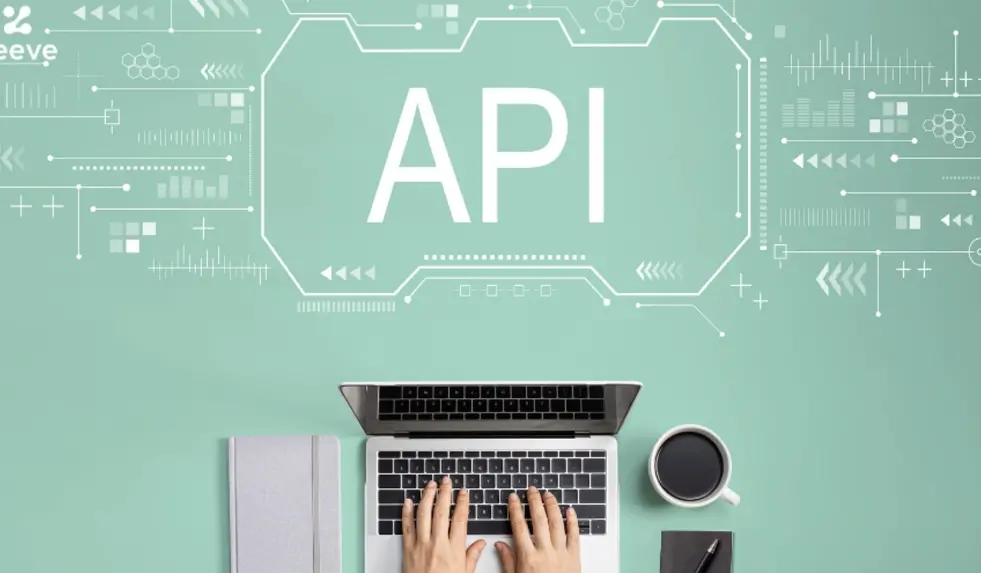The current situation of DAO: Examining the DAO ecosystem from the perspectives of community building, governance, and integration with the off-chain world
Original Title: "Inventory | Understanding the Current State of DAOs in One Article"
Original Author: BanklessDAO Writers Guild
Original Translator: SNode, Rhythm
You are reading the current state of DAOs, a high-quality newsletter designed to help you understand DAOs.
The current state of DAOs curates high-quality content from the DAO ecosystem and presents it in an easy-to-understand format for your reference.
This week, we have prepared a series of resources on how to join a DAO to kickstart your own DAO journey. Then, we will examine the DAO ecosystem from perspectives such as community building, governance, and integration with the off-chain world. There is a lot to explore, so let’s get started!
1. How to Join a DAO
Author: Samantha Marin
You want to join a DAO. Welcome! You will find many like-minded partners. In this article, we will briefly introduce the first step to starting your DAO journey. Then, we will compile some common FAQs and action items to help you smoothly enter the wild west of decentralized work, earnings, and community.
Step 1: Research the DAO Ecosystem
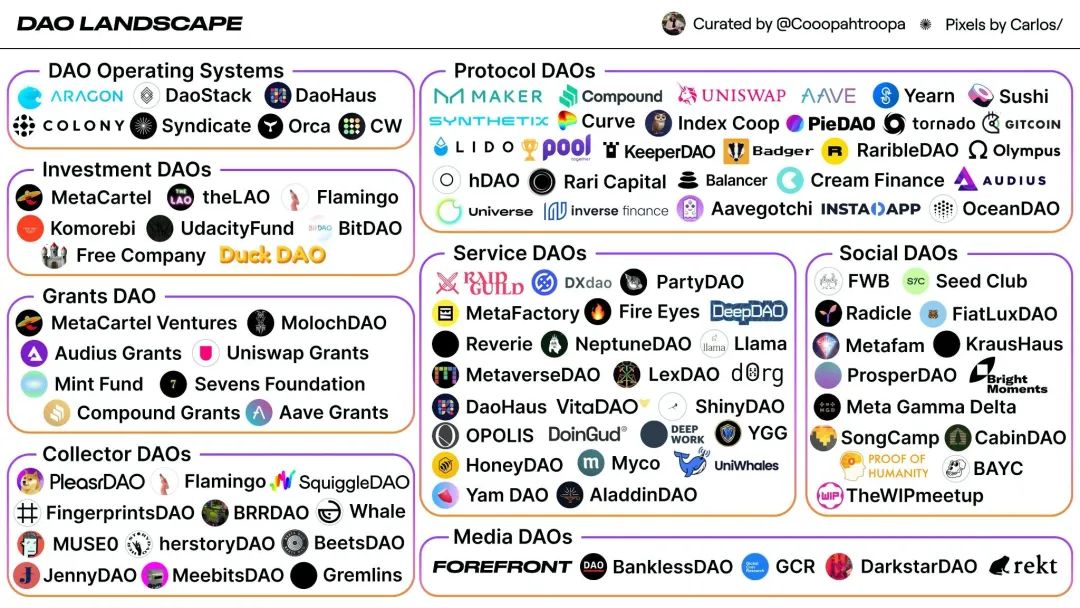
There are many types of DAOs, including social DAOs, protocol DAOs, and project-based DAOs, even those transformed from companies. Since there is no complete DAO information repository, you need to do some online digging to find the DAO that suits you. Here are some resources to help you get started.
DAO Landscape, created by @Cooopahtroopa on Mirror.
This extensive list of DAO resources, created by @kinjal on Mirror.
DAO project database maintained by DAOists.
Top DAOs, from token market cap.
The Stateless newsletter, featuring this week's top DAO news.
Step 2: Choose the DAO That Best Fits Your Goals
You cannot truly understand a DAO's character unless you join it. However, if you do not want to purchase governance tokens required for voting, it is possible to join without voting rights. Each DAO is different, but many allow you to explore without purchasing tokens.
Most DAOs operate through Discord, so search on Twitter to find out how to join. Additionally, some DAOs have publicly accessible websites or repositories of information. For example, Bankless DAO's Notion page is a hub for all important resources.
When you join a DAO, the first thing you should assess is the atmosphere. The core of a DAO is its community. It is the people in the community that make the DAO such a great workplace. Unlike traditional jobs, the switching costs from one DAO to another are low, so be sure to find a place where you can get along well with colleagues and reflect the values you hold.
There are many things to do in a DAO, and various activities are increasing. We recommend starting with one DAO before deciding to join multiple DAOs. You may even find yourself working full-time for one DAO, so don’t rush into joining various DAOs!
Image Source: New Collaboration Frontier Report
Step 3: Start Working
Now you are in a DAO! Congratulations. Your top priority is not to get overwhelmed. There are a range of activities in a DAO, mainly on Discord. You may want to read all the messages, but keeping up with every workflow is nearly impossible. This process can be discouraging and ultimately exhausting.
The best way to start is to find a place where you can provide value. Pick one thing to start doing. Whether it’s taking notes for meetings or jumping into a channel to brainstorm with other members, start small, and as long as you stay grounded, you can gradually move towards success.
Attending meetings is often the best entry point. That’s why there’s a calendar at the bottom of this article! It’s hard to grasp everything happening in a DAO just by reading Discord text channels. Listening to other members talk is the best way to understand your colleagues in the DAO. It’s also easier to introduce yourself there, so your message won’t get lost in the channel.
While it may seem daunting, it’s important to get involved in a project as soon as possible. Of course, it’s fine to read channel content, listen to a few meetings, and then not contribute anything. You can always withdraw from projects that require little investment or seem unpromising. Ask other DAO members which project is a good starting point and join it! Always seek help and advice so you can get up to speed quickly.
Step 4: Contribute to Governance
At this point, you are basically a member of a DAO, and it’s time to participate in governance. To vote, you need to hold a certain amount of governance tokens. You can buy tokens directly, usually through Uniswap or SushiSwap. But another way to collect tokens is to roll up your sleeves and start working. DAO staff often receive DAO governance tokens as compensation, so you can become a voting member through your efforts. Every contribution you make in the DAO will earn you token rewards, so the more work you put in, the faster you will become a voting member.
The types of projects your DAO undertakes (and pays you to complete) will depend on the DAO you are in. For example, in Bankless DAO, members can earn rewards by writing articles, designing graphics, developing internal products for our DAO, creating videos, and more.
Q&A
--- Do you have to pay to join a DAO?
It depends on the different DAOs. Some DAOs allow free entry into their communities. Others require you to purchase tokens. For example, Bankless DAO has a visitor pass system and read-only Discord channels, so potential members can learn about the DAO before investing funds.
--- Do you need to be a crypto expert or developer to join a DAO?
No. DAOs need people with a wide range of skills and knowledge bases. For example, many DAOs have writers, graphic designers, marketers, software developers, translators, artists, videographers, community leaders, and more.
--- How much time do you need to dedicate to a DAO each week?
You can contribute as much as you want—that’s the beauty of open-source projects built through grassroots communities. Unlike a strict 9-to-5 job, you can contribute 2 hours a week and still be a valuable DAO member. Or, you can contribute to multiple projects and eventually earn a full-time salary on-chain. (Quitting your boring job? Good idea.) It really is that simple!
Join DAO Action Checklist:
Research the DAO ecosystem to see which organization suits you best.
Check their social media and online resources for guides and useful links.
Join Discord and start contributing in areas that interest you. Don’t spread yourself too thin across too many projects too early. If possible, join a meeting!
Earn on-chain rewards and enjoy the benefits of being a voting member of a cutting-edge organization.
2. Overview of DAOs | Understand the Current State of the DAO Ecosystem Through Curated Articles
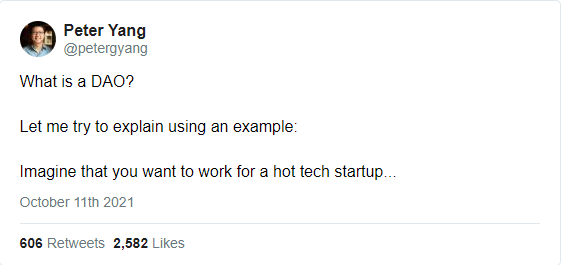
“How to DAO from Day 1” (Translated Version)
Author: Fancyyyyyy_
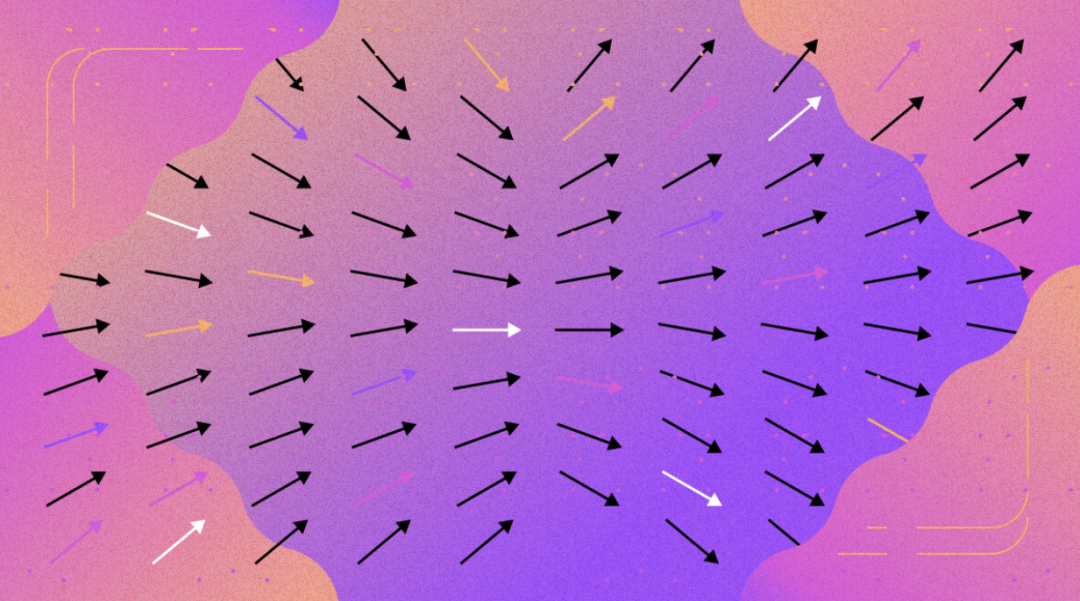
This article explains how a new member can become more involved in a DAO and how a DAO should be structured to simplify this process. From diving in on day one to quitting your job to work full-time for a DAO, this article provides an upgrade plan.
Level 1 - Check the atmosphere and start communicating.
Level 2 - Create value by contributing to the community.
Level 3 - Make long-term commitments for the entire season.
Level 4 - Quit your job and work full-time for the DAO, becoming a core contributor.
Sponsor: DAOhaus UberHaus
Chief Coordinator: Stephen Reid
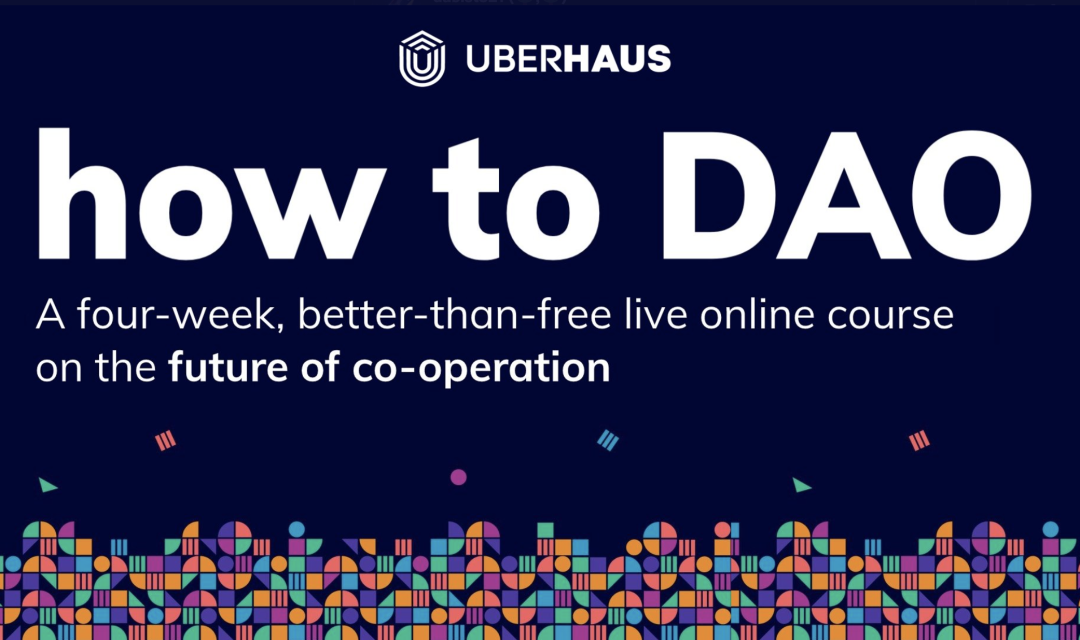
This series of online videos, articles, and lectures is equivalent to a 101 course on DAO university level. The four lessons cover a wealth of material, including beginner basics, an overview of the DAO landscape and basic governance structures, and insights into DAOs and the future of work. Each lesson includes pre-reading materials and homework. Sharpen your pencil; this course is a must for the future of work! Sign up here.
Lesson 1: Introduction to DAOs
Lesson 2: Introduction to DAOHaus
Lesson 3: Deep Dive into DAOHaus
Lesson 4: The Future of DAOs
“Working for a DAO”
Click: Video Link
This is a one-hour video featuring a discussion by Gaby Goldberg, Cooper Turley, and Alex Zhang at the Governance and DAO Summit during ETHOnline2021 about "Working for a DAO." This conversation gives us insight into what it’s like to work for a DAO on a daily basis—specifically, working for Friends with Benefits. They delve into how they entered the DAO space and when they decided to work for a DAO full-time. The conversation covers the following topics:
Challenges faced when transitioning from web2 companies to the web3 world.
How concepts of compensation and equity operate within DAOs.
How future work can allow your skills to be applied across multiple DAOs rather than just for one company.
How to figure out how to start contributing and engage with the community.
“Separation Pods: Improved Token Voting”
Authors: Maria Gomez, Julia Rosenberg, and Chun Poon
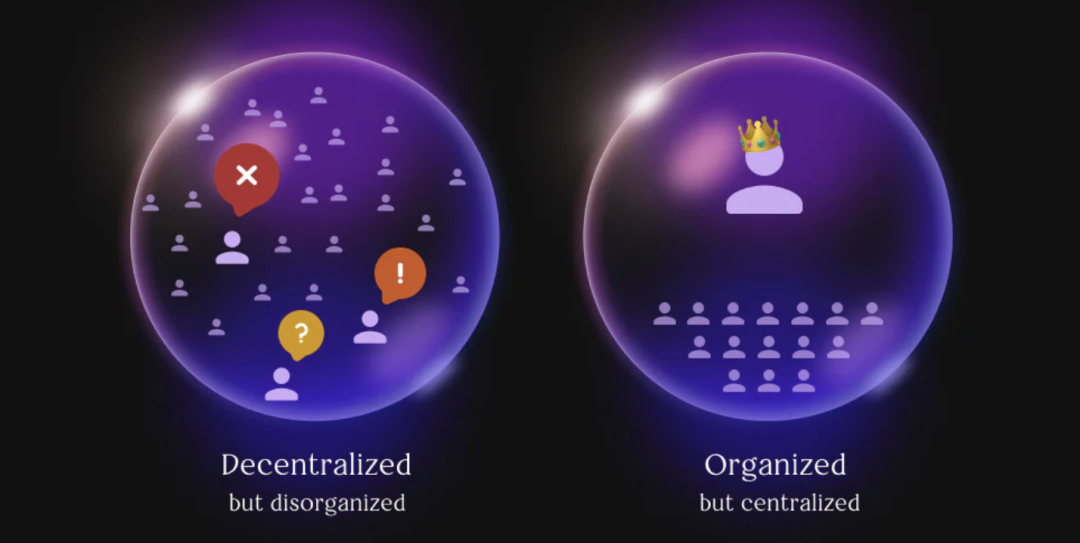
The Orca protocol aims to address token voting issues by establishing a unique organizational structure that builds sub-DAOs within larger DAO systems, achieving horizontal and vertical synchronization to help DAOs expand further.
Decentralization can make organizations more chaotic.
Making operations more organized means compromising on decentralization.
Token voting may fundamentally deviate from the intrinsic incentive structures of DAOs.
The Orca protocol's token voting solution involves setting up multiple "separation pods" as sub-DAOs within larger DAOs.
Each "pod" will control its operations and funds through its own multi-signature.
Each "pod" will vote on DAO governance, extracting the governance process from token holders.
“MakerDAO Members Discuss Incorporation and Taxation and Some More Profound Issues”
Author: Brady Dale
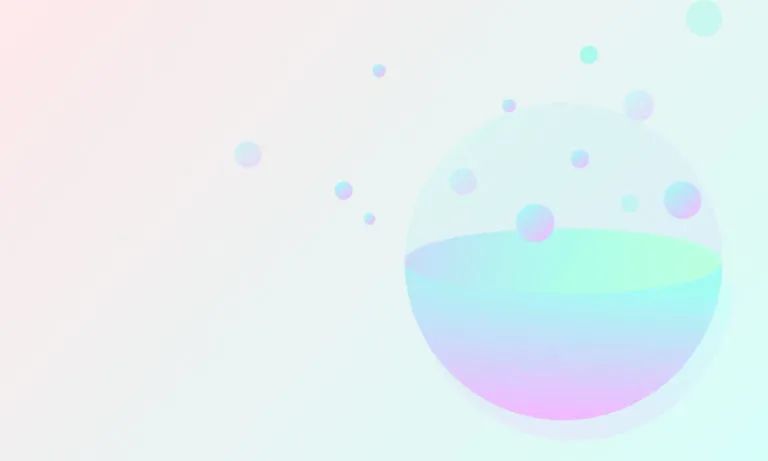
MakerDAO is engaging in a discussion about how it should relate to governments around the world, which will have far-reaching implications beyond just taxation. Here are some key points to consider:
The tax implications of transitioning fully from the Maker Foundation to a DAO.
If they were to incorporate, which jurisdiction would they choose?
MakerDAO currently has no legal structure. There is no consensus on how DAOs should be classified.
Concerns about unlimited liability have sparked proposals such as establishing a self-insurance fund.
3. Ecosystem Record: Insights into the Entire DAO Ecosystem
Author: Sam McCarthy
Key Points:
"Value" can be understood from economic, sociological, or linguistic perspectives.
When actions and objects are incorporated into social systems, they become meaningful or valuable to humans.
Governance tokens with voting rights allow people to freely express their thoughts and beliefs by contributing to and voting on community proposals in an open forum.
In web3, the value of governance tokens comes from their ability to influence the evolution of new systems, define the impact they will have on society, and accumulate relevant status and reputation.
Governance premiums equal the value of participating in protocol governance, reflecting investors' perception of their control over the project's future.
Variables affecting governance premiums include project growth, "Assets Under Management" (AUM), and community strength.
“With New Legislation in Wyoming, DAOs Are Going Mainstream”
Author: Navid Ladani
Key Points:
After the relevant legislation took effect last July, Wyoming became the first state in the U.S. to recognize DAOs as legal entities and grant them the same rights as limited liability companies (LLCs).
BLOCKS became the first DAO LLC in the state, continuing to advance the goal of integrating businesses with blockchain.
Now, the organization intends to launch its services in the state and around the world.
“Introduction to the Bounty Economy”
Author: Richard Patey
Key Points:
Bounties provide a relatively smooth way to match enthusiasm with projects.
Many communities, including Bankless, have developed a task library, with each task having corresponding rewards to continuously advance the overall goals of the organization.
Goodbye resumes! Now your wallet is proof of skills and achievements.
“Why the Chief Community Officer is the New CEO”
Author: Alejandro Navia
Key Points:
Community managers are moving towards the role of "Chief Community Officer."
As the metaverse evolves, the importance of community management is also growing.
The Chief Community Officer is different from the Chief Marketing Officer; community comes before social media.
Community is not about business; it's about people. The Chief Community Officer guides members beyond their limits, making the impossible possible.
Authors: Kiran Cherukuri and Gaby Goldberg
Key Points:
Decentralized Autonomous Media Network, also known as DAMN, is a DAO focused purely on media content creation and curation.
DAMN will expand into new markets by establishing a niche community.
By having a single focus and minimal governance, the organization can streamline workflows.
As the token economy is directly tied to content creation, token prices will be directly related to the quality of the content.
4. Get Involved: Current State of DAOs - Beginner-Friendly Activities
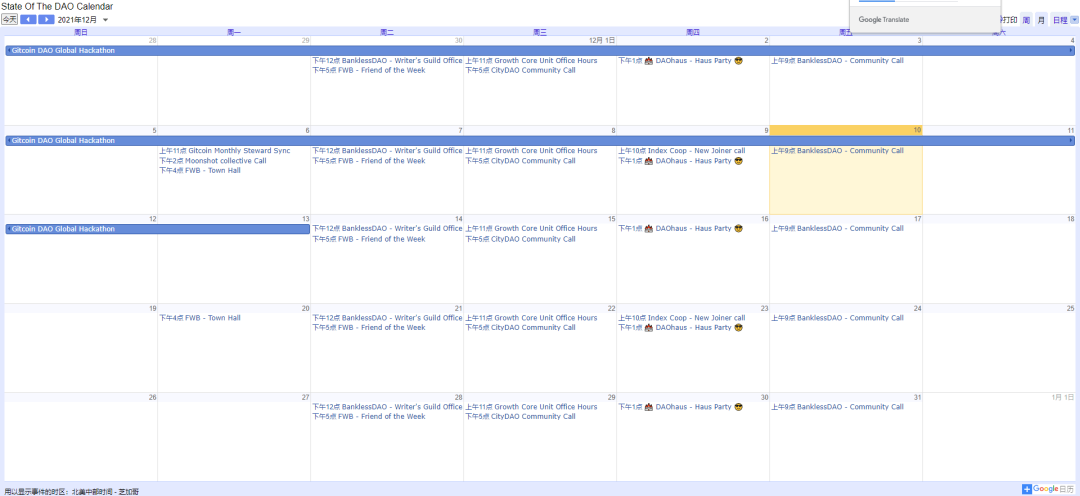
DAO Spotlight: CityDAO
Putting land on the blockchain! Crazy idea, right?
Meet CityDAO - this community has a bold ambition to build a city on the blockchain!
--- Where is this happening?
In the vast, resource-rich state of Wyoming! Another interesting fact about Wyoming - it is the first state to recognize DAOs as legal entities.
CityDAO's mission is to create a city where each piece of land is an NFT that can be co-owned by the DAO or individuals. The governance of the DAO is directly related to citizenship.
--- What does this mean?
CityDAO's citizenship is tiered, with different rights at each level. CityDAO citizens receive priority for NFT airdrops representing land and also gain access to internal Discord channels. There are three different citizenship NFTs:
First Citizen NFT - This highest-level NFT is unique, granting exclusive naming rights and priority participation in land airdrops, along with voting rights and access to the citizen Discord channel!
Founding Citizen NFT - This level has a total of 50 NFTs, granting holders participation rights in land airdrops, second only to the First Citizen, as well as voting rights and access to the citizen Discord channel.
Citizen NFT - This NFT has a total supply of 10,000, granting participation rights in land airdrops after the First Citizen and Founding Citizen. Citizens also have voting rights and access to the citizen Discord channel.



